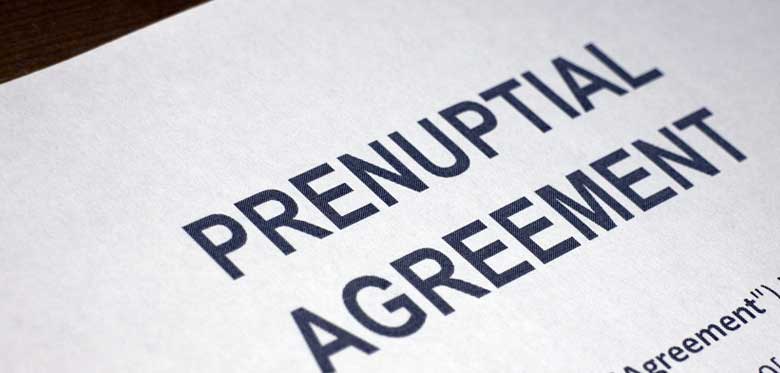Prenuptial agreements take the form of a written agreement between a couple prior to their marriage. The purpose of a prenup is to set out ownership of all of the couple’s belongings (assets, money and property) and explains how these possessions will be divided in the unfortunate event of a divorce.
An agreement is not just for the extraordinarily wealthy or celebrities. Today many people marry later in life than previous generations and therefore may have accumulated more assets by the time they enter into the marriage, this has seen prenuptial agreements become more prevalent amongst newly-weds. Prenuptial agreement don’t need to be viewed in a negative light and if you are getting married it’s perfectly understandable to want to take precautions to protect what you already own. To begin preparing your own prenuptial agreement, get in touch with the experts at Stephensons today.
Are prenuptial agreements legally binding?
At the present time in England and Wales prenuptial agreements are not legally binding, however the court do not dismiss them out of hand and will be carefully consider any prenuptial agreement entered into. A court will consider such factors as:
- Did both parties enter into the agreement voluntarily and without duress?
- Did both parties understand the implications of the agreement?
- Was there full disclosure of assets and liabilities?
- Are the terms of the agreement fair?
- Did both parties obtain legal advice?
If the answer to all above is yes, then there is a strong probability that a UK court will uphold the agreement.
It is advisable that a prenuptial agreement is signed by both parties at least 28 days before marriage to ensure both parties were afforded sufficient time to consider, a ‘cooling off’ period and also provide evidence to a court no pressure or duress was placed on the other person.
Cost of a prenuptial agreement
The cost of an agreement usually depends on your situation and the amount of assets that you would like to protect. The cost will not only include drafting and amending the agreement to suit your own individual needs but will also include the receipt of expert knowledge and advice from one of our professional family law solicitors who can help you to ensure you include everything necessary in the agreement. Our professional team will listen to exactly what you would like to happen should your relationship end and accommodate these wishes as best we can, into your prenup agreement. The process will begin by one of our professional solicitors collecting all of the information that we need to obtain an agreement for your signature and it is worth noting that the courts of law are not required to abide by this agreement but unless there has been significant changes and or all of the requirements have not been met, they are more than likely to upheld.
How to get a prenuptial agreement
Prenuptial agreements can provide a significant level of certainty to any individual entering a marriage and so is definitely worth looking into. The best way to get prenuptial agreements is with the help of a solicitor. Many people consider creating their own in the hope of making the process as hassle free as possible as well as saving money but often this can mean that the agreement doesn’t carry as much weight in court. With a solicitor-approved prenuptial agreement, you can ensure that all the terms of your agreement are adhered to as far as possible and that your assets are not compromised in the event of a divorce.
Prenuptial agreements: Frequently asked questions
What is the point of a prenuptial agreement?
Prenuptial agreements are designed to secure your assets (property, pensions and savings) in the event of the breakdown of your marriage. As well as security of assets, a prenuptial agreement’s purpose is to allow a couple to enter marriage with the peace of mind of knowing that should the marriage breakdown, their assets and money is secure. A pre-marital agreement is a way of planning so that financial matters are settled in advance as far as possible, usually in the event of divorce and sometimes in the event of death.
Who should get a prenuptial agreement?
Anyone who has personal assets would be advised to get a prenuptial agreement. A prenuptial agreement might also be advised to those that have children from a previous marriage. A prenuptial agreement will clarify the financial rights and responsibilities of each party during the marriage as well as distribute assets fairly should the marriage breakdown.
What happens if you don’t sign a prenuptial agreement?
If you don’t have a prenuptial agreement and your marriage breaks down, you may not be able to protect certain assets. In fact, it is likely that your marital assets as well as your properties will be divided equally which could even include family heirlooms and businesses. Basically, if you would like to protect something as your own, it is worth looking into prenuptial agreements in the event of your up and coming marriage.
How valid is a prenuptial agreement?
A prenuptial agreement is not currently legal binding in the UK but a Judge is likely to take the contracts into consideration and uphold them as long as they are sure that certain checks were put into place. These checks include ensuring that both parties received independent legal advice, they both fully disclosed their assets and that neither party was under duress to sign the agreement.
For more information about creating or enforcing prenuptial agreements, don’t hesitate to get in touch with our solicitors today, call out team on 0161 696 6193 or complete our online enquiry form and we'll contact you directly.




Comments